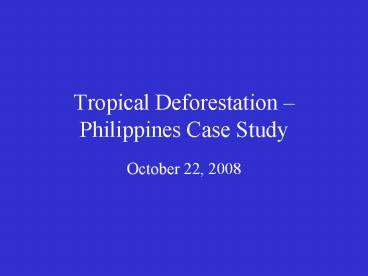Tropical Deforestation Philippines Case Study - PowerPoint PPT Presentation
1 / 11
Title:
Tropical Deforestation Philippines Case Study
Description:
... Asian nations (Philippines, Indonesia, Malaysia) with high-value tropical ... appreciation of the 'political economy' of the region (history, political ... – PowerPoint PPT presentation
Number of Views:992
Avg rating:3.0/5.0
Title: Tropical Deforestation Philippines Case Study
1
Tropical Deforestation Philippines Case Study
- October 22, 2008
2
The Political Economy of Tropical Deforestation
- 1. Most of the benefits of preserving forests
cannot be captured by the government or the
people that live in that country. - 2. Most of the benefits of preserving forests can
only be realized over a long period of time, they
are a STEADY FLOW of income as opposed to a
one-time harvest. - 3. Most of the benefits from CUTTING forests can
be captured by a small group of powerful elites
in a country, while the costs of deforestation
(e.g. flooding) are borne by society as a whole.
3
Background on the Philippines
- Located in Southeast Asia
- Over 7,000 islands and over 80 languages spoken
- A Spanish colony from 1565-1898, an American
colony from 1898-1946 - Only Roman Catholic nation in Asia
- 2000 population 77 million, 2.5 growth rate
(country the size of Nevada)
4
The Philippines Biodiversity Hotspot
- The Philippines is one of 25 global biodiversity
hotspots, and is ranked as the 5th most important
overall - 7,620 species of plants (5,832 are endemic)
- 179 species of mammals (111 are endemic)
- 576 species of birds (195 are endemic)
- 258 species of reptiles (170 are endemic)
5
The Philippine Monkey-eating Eagle
The Tarsier (one of the smallest primates)
6
Forest Cover in the Philippines
- 1948 52
- 1969 33
- 1980 26
- 1997 18
7
Logging Deforestation link strongest in
Southeast Asian nations (Philippines, Indonesia,
Malaysia) with high-value tropical hardwood
species.
8
Political Economic Context of Deforestation in
the Philippines
- Urban/Rural poverty failed development,
corruption - 40 billion foreign debt
- High rates of landlessness, best land
concentrated in the hands of a few families and
used to grow EXPORT crops (see foreign debt) - Fairly rapid population growth (poverty
population cycle) - Resulted in heavy migration of landless farmers
into logged over areas and secondary forests via
logging roads
9
Images from February 2006 landslides in Leyte
10
Programs/Policies to Address Deforestation
- Land reform
- Foreign debt forgiveness
- Extractive reserves/ biosphere reserves (focus on
extractive products) - Eco-tourism
- Agro-forestry
- Population policy
11
Solutions to Deforestation Need to Be ..
- Site and time-specific (no magic bullet)
- Based on an appreciation of the political
economy of the region (history, political
situation, economic conditions) - Based on the ROOT causes of the problem
- Based on a recognition of local people as part of
the solution, not just part of the problem































